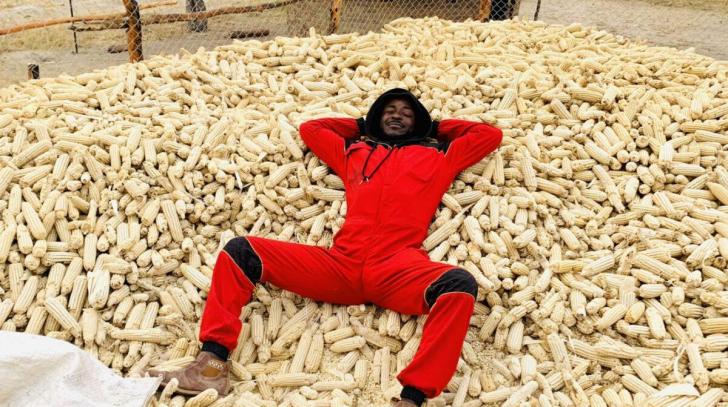News / National
Zimbabwe maize imports to decline
6 hrs ago | Views

Zimbabwe's maize imports are set to decline significantly this year as better rainfall has boosted crop yields across the country, easing pressure on food security.
According to the latest report by the United States Department of Agriculture's Foreign Agricultural Service, the country's maize output is expected to reach 1.3 million tonnes for the 2025/26 season. This marks a major recovery from the 635,000 tonnes produced last year when drought conditions devastated much of the harvest.
The report attributes the rebound to favourable weather patterns influenced by La Niña, which brought well-timed rains during the critical second half of the growing season.
"The favourable climatic conditions in the latter part of the growing season contributed to better maize crop development across most producing regions," the report stated.
As a result of the improved harvest, Zimbabwe's maize import needs are projected to fall by 300,000 tonnes, to 1 million tonnes. The country had relied heavily on imports last season following widespread crop failure.
Despite the rebound in output, domestic maize demand remains high, projected at 2.2 million tonnes - an 8% increase from the previous season. This is largely driven by rising consumption for both human food and livestock feed.
To bridge the gap between supply and demand, Zimbabwe is expected to continue sourcing maize from South Africa, which currently has around 1.5 million tonnes available for export.
However, structural inefficiencies continue to weigh on the sector. Although communal farmers cultivate over 60% of Zimbabwe's maize land, they contribute less than 40% of national output due to consistently low yields. The report highlights that more than 90% of the country's maize production depends on rainfall, as irrigation infrastructure is severely lacking, especially among smallholder farmers.
"High costs of fertiliser, fuel, and other inputs continue to constrain productive efficiency, especially for communal growers," the report noted.
Agricultural experts have called on the government to invest more in irrigation systems and modern agricultural technologies to improve productivity and insulate the sector from climate shocks.
The news comes as Zimbabwe continues to recover from an El Niño-induced drought that left over five million people in need of emergency food aid. President Emmerson Mnangagwa declared the drought a national disaster earlier this year.
Meanwhile, the government has projected a national cereal surplus of approximately 812,000 tonnes. According to Information Minister Jenfan Muswere, Zimbabwe expects to have a total cereal stock of 3.01 million tonnes, including a harvest of 2,928,206 tonnes and a strategic reserve of 83,526 tonnes.
Muswere said during a post-Cabinet briefing on Tuesday that the government is now discontinuing maize imports based on this positive supply outlook.
According to the latest report by the United States Department of Agriculture's Foreign Agricultural Service, the country's maize output is expected to reach 1.3 million tonnes for the 2025/26 season. This marks a major recovery from the 635,000 tonnes produced last year when drought conditions devastated much of the harvest.
The report attributes the rebound to favourable weather patterns influenced by La Niña, which brought well-timed rains during the critical second half of the growing season.
"The favourable climatic conditions in the latter part of the growing season contributed to better maize crop development across most producing regions," the report stated.
As a result of the improved harvest, Zimbabwe's maize import needs are projected to fall by 300,000 tonnes, to 1 million tonnes. The country had relied heavily on imports last season following widespread crop failure.
Despite the rebound in output, domestic maize demand remains high, projected at 2.2 million tonnes - an 8% increase from the previous season. This is largely driven by rising consumption for both human food and livestock feed.
However, structural inefficiencies continue to weigh on the sector. Although communal farmers cultivate over 60% of Zimbabwe's maize land, they contribute less than 40% of national output due to consistently low yields. The report highlights that more than 90% of the country's maize production depends on rainfall, as irrigation infrastructure is severely lacking, especially among smallholder farmers.
"High costs of fertiliser, fuel, and other inputs continue to constrain productive efficiency, especially for communal growers," the report noted.
Agricultural experts have called on the government to invest more in irrigation systems and modern agricultural technologies to improve productivity and insulate the sector from climate shocks.
The news comes as Zimbabwe continues to recover from an El Niño-induced drought that left over five million people in need of emergency food aid. President Emmerson Mnangagwa declared the drought a national disaster earlier this year.
Meanwhile, the government has projected a national cereal surplus of approximately 812,000 tonnes. According to Information Minister Jenfan Muswere, Zimbabwe expects to have a total cereal stock of 3.01 million tonnes, including a harvest of 2,928,206 tonnes and a strategic reserve of 83,526 tonnes.
Muswere said during a post-Cabinet briefing on Tuesday that the government is now discontinuing maize imports based on this positive supply outlook.
Source - newsday









































